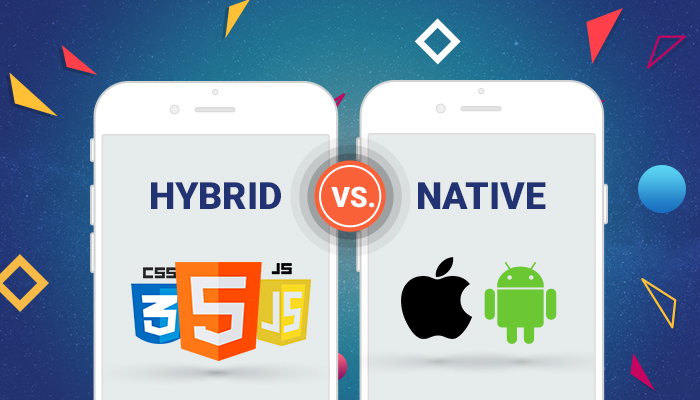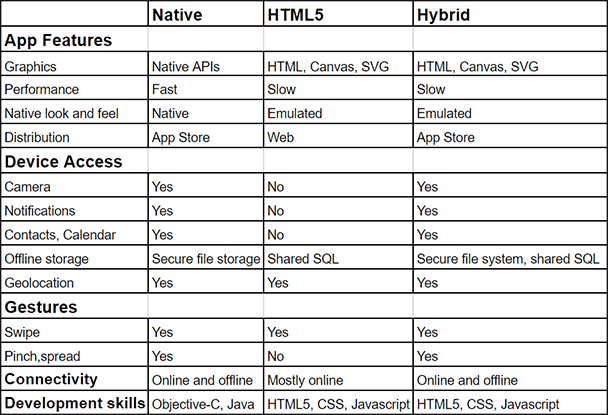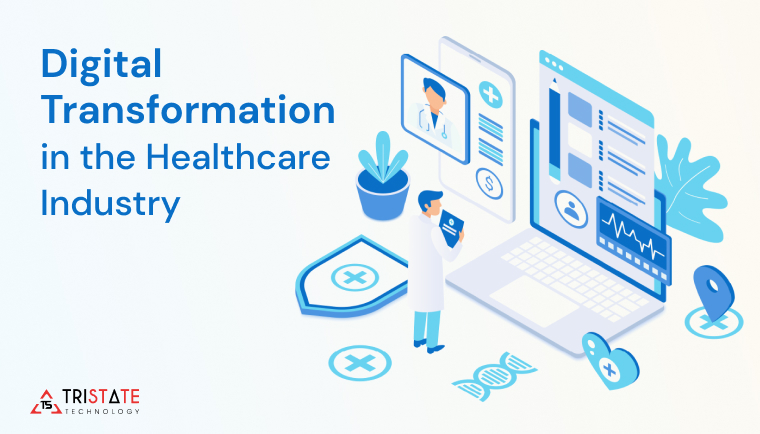
Whether to choose Native mobile app development or Hybrid mobile app development for a business is a tricky decision.
Before you plan to think of a mobile app, you would have to solve your question about whether you should go for Android or iOS .
Once, that is resolved, you come up with another confusion-
What is the Difference Between Hybrid and Native apps and which is better for my business?
Well, it is mainly difficult for the following people to decide on whether to choose Native or Hybrid mobile app development:
- Business owners, investors, stakeholders, etc.
- The mobile app development company
- Freelance mobile app developers
So, let’s directly jump on to understand-
- What is a Native mobile app?
- What are the key benefits of Native mobile apps?
- What are the limitations of the Native mobile apps?
- What is a Hybrid mobile app?
- What are the advantages of Hybrid mobile apps?
- What are the limitations of the Hybrid mobile apps?
- What to choose and how to choose: Native Vs. Hybrid?
What is a Native Mobile Application?
A Native mobile application is specifically developed in order to run on a particular operating system- Android or iOS. This means that the Native mobile app when developed for Android, you cannot use it in iOS and vice versa.
Being specific to the particular platforms, when the Native mobile app is built for Android, it is written in Java programming language because Android only supports Java.
The same is the case with iOS. When the Native mobile app is developed for iOS, it is written in Swift and Objective-C.
In fact, the Native mobile apps are built using their own specific platform-based Integrated Development Environment (IDE), development tools, UI, testing framework, and SDK.
Benefits of Native Mobile Apps
Check out the advantages of having Native mobile applications:
- They work efficiently as they are built for that specific platforms
- Native apps are responsive on all the platform-specific devices
- They are very fast and the best in the app performance
- Native apps better integrate with mobile hardware
- They have interactive and intuitive User Interface (UI) and User Experience (UX) as per the user expectations based on specific platforms
- Some of the Native mobile apps work even without the Internet connection
- Native apps are secured and reliable
- They can easily access or utilize the other device-specific capabilities like GPS, Camera, Contacts, etc.
- You can find them in the App stores
- They are easy to learn and use for the users
- Both Apple and Google offer a great support for the Native apps built on their platforms
Disadvantages of Native Mobile Apps
Following are the cons of developing a Native mobile application:
- Highly expensive while developing and maintaining Native mobile apps for multiple mobile devices and platforms
- It takes a lot of time to develop Native mobile apps for multiple platforms
- Submitting the Native mobile apps for approval in the App Stores is a long and tiresome process
- Also, after investing time, money, and efforts, not necessarily the Native mobile apps get approved by the App Stores
- There are chances that the Native mobile app users of multiple devices might be using different versions of the app which makes it difficult to maintain and offer support
What is a Hybrid Mobile Application?
The Hybrid mobile application is any mobile application that you see in the app stores, download them, and use them on any of your mobile platform and device.
The Hybrid mobile apps are just like any website that you access on the Internet. They are built using the combination of web technologies such as HTML, CSS, and JavaScript.
But, Hybrid mobile apps are hosted on a platform-specific native application to use that specific platform’s WebView. With such an environment, the Hybrid mobile apps can easily access the data and the capabilities of the specific mobile platforms.
This makes the Hybrid mobile apps to function like any other native mobile apps on that particular mobile platform and device. Well, the mobile app user cannot make out whether the app is Native or Hybrid.
Benefits of Hybrid Mobile Apps
Following are the advantages of the Hybrid Mobile Apps:
- It is easy to write the code for Hybrid mobile apps and integrate with the backend
- The developers have to write single code base and can compile it across multiple platforms
- So, the Hybrid mobile app is developed faster which results in faster “time-to-market”
- The development cost is also cheaper compared to websites or native mobile app development
- The UI/UX is much better when it comes to having the mobile app responsive on all the mobile platforms and devices with the Hybrid mobile apps
- The Hybrid mobile apps load faster even without Internet connectivity as it stores the data utilizing the specific device’s APIs
- It is easy to update the Hybrid app versions as it happens real-time
Disadvantages of Hybrid Mobile Apps
Let’s check out the cons of the Hybrid mobile apps:
- The main disadvantage of the Hybrid mobile apps is the performance as it renders the app in WebView which slows down the overall performance of the app.
- It becomes difficult for the developers to look for the app experiencing bugs on which platforms and devices because of the extra thin layer of native component.
- Looking at the advancements the mobile platforms are coming up with, it sounds difficult to utilize all the features and capabilities of all the mobile platforms and devices using Hybrid framework.
How to Decide Which is Better: Native or Hybrid Mobile Apps?
Here, Salesforce come up with a very clear picture to help all of you understand the picture-perfect difference between the Native and Hybrid mobile app development.
Well, there is also a comparison with HTML5. But, since HTML5 does not support any features and capabilities with the mobile devices, this is not the right place to discuss about it.

So, how to choose-
Native vs. Hybrid Mobile App Development?
Now you know the difference between the Native and the Hybrid mobile apps. So, the only thing you need to know is- which one is better for your business.
To choose the right app development framework, you need to pen down the following things before you make a decision:
1. What is your purpose behind developing a mobile app?
Whether you are a business owner or a mobile app development company, you need to understand the purpose behind developing a mobile app.
This means- Why do you want to develop a mobile app?
- Improve your business visibility to the customers at all times
- Build brand awareness and brand reputation
- Improve customer engagement and experience
- Outperform the competition
- Create a bridge between the brand and the customers
- Boosts the sales and overall ROI

If the app is just to educate your customers across multiple platforms and devices, Hybrid might be the suitable option.
But, if your mobile app is expected to perform certain critical functionalities such as payments, messaging, etc., the performance of the app matters the most and hence, you need to think of a Native mobile app.
Hence, first understand the purpose of developing a mobile app and then, check out how much the app performance matter.
2. How much are you looking to invest?
After looking at the purpose of your mobile app development, you need to look at the budget as well.
Being a business owner, budget is the most important factor as mobile app development is a business investment for you.
And, for mobile app development team, budget is the most critical part to decide on which app development framework to choose.
Both the owners and the development team has to come up with the right fit that even fits the budget.
3. In how much time are you looking to launch?
Like one of the most important parameters is also to see how much time it takes to develop a Native or the Hybrid mobile app.
How Long Does it Take to Develop a Mobile App?
If you are looking forward to faster time-to-market, you shall consider Hybrid and if not, then Native.
But, it is important for you to consider all the above points before making a decision.
Final Thoughts
Developing a mobile app is an investment and hence, you need to be clear about your plans. A perfect plan can help you decide on what to choose between Native mobile apps or Hybrid mobile apps.
Also, if you are still confused, you should consider discussing your app idea and plans with the mobile app development experts.




